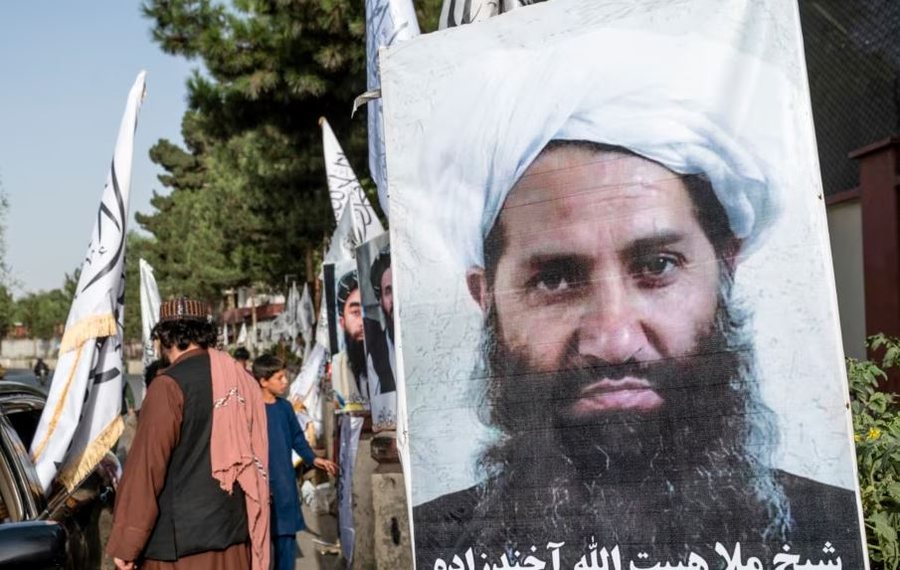
The Taliban have for years presented themselves to the outside world as a united front and have kept opponents within their ranks under tight control.
However, the unprecedented display of dissent has brought divisions within the militant group to the surface, and highlighted a major power struggle.
Internal divisions could turn into violence and trigger a new civil war that would further destabilize the violent region, experts warn.
"Despite their habit of unity and secrecy, they have recently publicly demonstrated their lack of unity," said Michael Semple, a former EU and UN adviser in Afghanistan.
"These suggest that this movement is facing real trouble," he added.
"Chaos and uncertainty"
In December, the Taliban's Minister of Refugees, Khalil Haqqani, was killed in a suicide attack. He is the highest-ranking official to be killed since the radical Islamist group took power in 2021.
According to experts, most of Haqqani's supporters privately accused his rivals within the Taliban of ordering his assassination.
In January, a senior Taliban official fled the country without delay after criticizing the Taliban's spiritual leader, Mullah Haibatullah Akhundzada, who has the final say in the cleric-run system.
"Follow his teachings, but not to the point where, God forbid, you give him the rank of prophethood or divinity," said Sher Mohammad Abbas Stanikzai, the Taliban's deputy foreign minister, according to an audio recording released last month. "If you deviate even one step from the path of God, then you are no longer my leader, I do not recognize you anymore."
Stanikzai also criticized Akhundzada's ban on women's education, which has been condemned by the international community.
He confirmed that he was in the United Arab Emirates, but said he went there for health reasons. But Stanikzai reportedly fled Afghanistan after Akhundzada issued an arrest warrant for him and ordered a travel ban.
Meanwhile, a large number of group members have openly complained about delays in receiving salaries.
The Taliban have denied there are divisions within the group. The group's main spokesman, Zabihullah Mujahid, told private Tolo News television that the group "will never be involved in disputes, will not become a source of division, and will not take actions that could bring disaster or restore instability to the country."
But several sources within the Taliban, who spoke to Radio Free Europe (RFE/RL) on condition of anonymity, described the current situation as "chaotic" and "unsafe."
The sources also said that officials have been prohibited from leaving the country without obtaining permission from Akhundzada.
"These developments suggest that Taliban unity is facing a real challenge, between those who feel marginalized and those who feel empowered," said Semple, a professor at Queen's University Belfast.
"We are now in a new situation. The political and military opposition to the Taliban is weaker than it was in the 1990s," Semple added, referring to the Taliban's first period in power.
"But the expectations of the Afghan population are much higher and the level of popular dissatisfaction with the Taliban is unprecedented. The disgruntled Taliban know this," he added.
Internal competition
Internal strife within the Taliban has come to the fore since the group regained power in 2021.
Akhundzada, who rarely leaves his stronghold in the southern city of Kandahar, has monopolized power, sidelined more moderate figures and implemented radical policies that have made Afghanistan an internationally isolated state.
Among Akhundzada's rivals is Sirajuddin Haqqani, the Taliban's interior minister and leader of the Haqqani network, a powerful faction with great influence in eastern Afghanistan.
Others include Mullah Mohammad Yaqub, the defense minister and son of the group's founder, Mullah Mohammad Omar, as well as Mullah Abdul Ghani Baradar, who headed the group's political office in Qatar and is deputy prime minister in the Taliban government.
"Recent events, especially tensions between different factions within the Taliban, pose a significant challenge to their unity, but they are not necessarily the biggest threat," said Hatef Mukhtar, director of the Center for Strategic Studies on Afghanistan.
There are divisions within the Taliban along ideological lines. Some Taliban leaders seek international recognition and economic investment, while others emphasize strict implementation of Islamic law, even if that leads to isolation, Mukhtar said.
According to him, the growing influence of the Kandahar-based leadership, at the expense of former battlefield and politburo commanders, is also a source of divisions.
Meanwhile, the extremist group Islamic State-Khorasan (IS-K) continues to pose a threat to the Taliban, testing their ability to maintain security.
Underscoring this threat, IS-K claimed responsibility for a suicide bombing near a bank in northern Afghanistan on February 11, which killed five people, the Taliban said.
But two sources within the Taliban, who spoke on condition of anonymity, said at least 14 people were killed in that attack, including members of the group.
The Taliban government, which is not internationally recognized and has huge financial shortfalls, is facing increasing economic pressure.
US President Donald Trump has frozen all international aid, including to Afghanistan. This is likely to worsen the humanitarian crisis in the country. Meanwhile, the value of the national currency, the Afghani, has recently fallen, fueling a price spike.
Experts say that, although the Taliban have shown resilience in managing internal disputes, rising tensions could threaten the group's cohesion.
The most likely scenario is "low-level clashes, assassinations and internal purges, rather than an open military confrontation," Mukhtar said.
"But if the Taliban fail to resolve their internal divisions, Afghanistan could face another cycle of internal Islamic conflict," he added./ REL (A2 Televizion)











